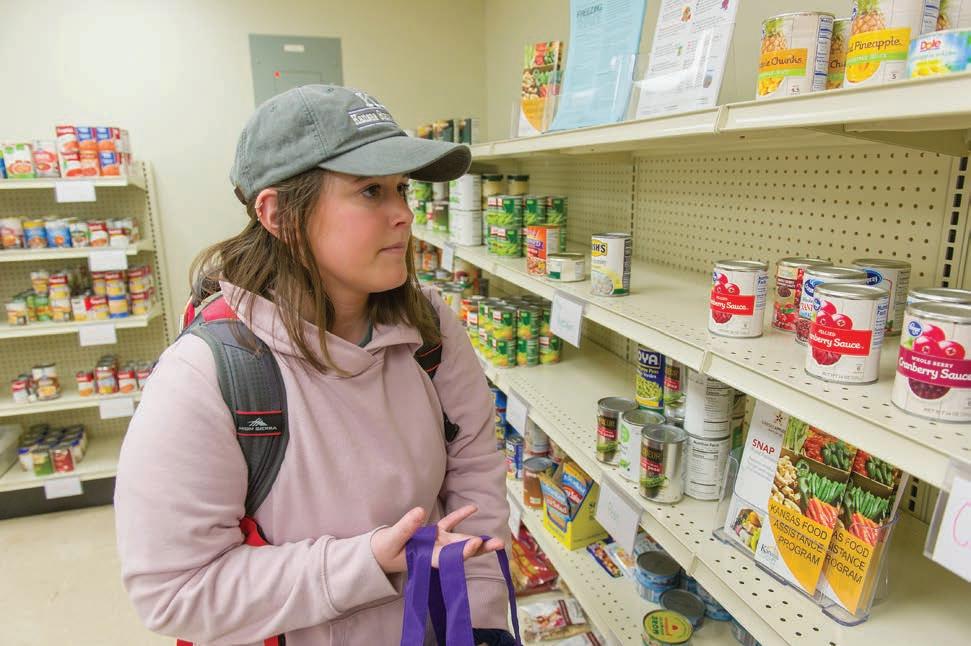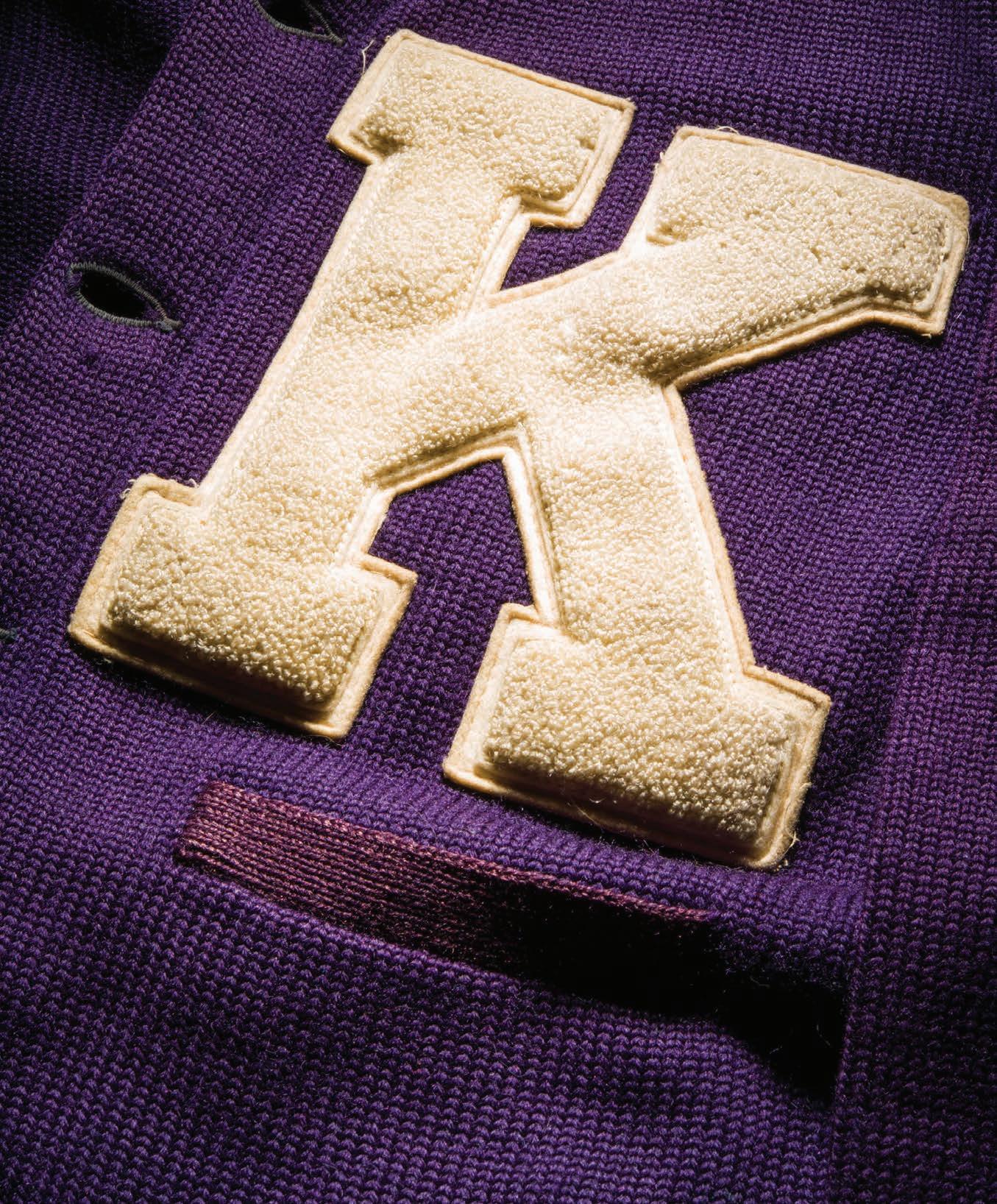
7 minute read
CHANGING THE WORLD
BY ASHLEY PAULS
PHOTOS COURTESY OF JERRY JAAX ’70, ’72 AND NANCY DUNN JAAX ’71, ’73 Together
Advertisement
Jerry Jaax ’70, ’72 and Nancy Dunn Jaax ’71, ’73 receive Alumni Excellence Award for distinguished careers in veterinary science, biosecurity and infectious disease research
When Nancy Dunn ’71, ’73 met Jerry Jaax ’70, ’72 at a student mixer during their time at Kansas State University, it was an event that not only changed their own lives but later the world. Nancy said she saw Jerry playing guitar, and there was an “instant attraction” between the two students. Since that moment, Nancy and Jerry have been a team, building a life together as well as military careers in veterinary science, biosecurity and infectious disease research.
The story of their groundbreaking work during the Reston, Virginia, Ebola outbreak in the late 1980s was featured in the bestselling nonfiction book The Hot Zone by Richard Preston, and more recently in a National Geographic miniseries of the same name, starring Julianna Margulies and Noah Emmerich.
In honor of their distinguished careers, Jerry and Nancy Jaax are being honored with the Alumni Excellence Award from the K-State Alumni Association.
“Once we completed our specialty training in Laboratory Animal Medicine (ACLAM) and Veterinary Pathology (ACVP), we were able to work in complimentary roles in biodefense and chemical defense research programs,” Jerry said. “We’ve never been anything but a team
“Both of us had a diverse and fulfilling veterinary military career. That’s an accomplishment.” DR. JERRY JAAX ’70, ’72

Jerry Jaax ’70,’ 72 and Nancy Dunn Jaax ’71, ’73 joined the Army Veterinary Corps after attending K-State. In 1975, the freshly minted captains were stationed at Fort Lewis Madigan Army Medical Center. and it’s worked great for us. We’ve always been together.”
THE MOST DANGEROUS WORK IN VETERINARY MEDICINE
Nancy grew up loving animals and knew she wanted to be a veterinarian from the time she was 6 years old. Although Jerry didn’t decide on a specific career quite that early, he grew up in a rural environment and also loved animals, and he wanted to do something in the medical field.
The Jaaxes joined the military after earning their veterinary medicine degrees from K-State. Jerry said the couple’s K-State experience gave them a generalized education that prepared them for almost anything and taught them how to be problem-solvers and adapt to evolving circumstances.
Although they didn’t initially foresee the military as a lifetime career, it turned out to be the perfect fit for the young couple. Due to the overlap in their careers, they were able to be part of the same meetings and collaborate on solving highlevel issues.
“We both retired as colonels,” Jerry said, adding that Nancy was one of the first female officers commissioned in the Army Veterinary Corps. “Both of us had a diverse and fulfilling veterinary
The Alumni Excellence Award is given to a graduate of Kansas State University whose career, service and achievements exemplify the spirit, values and excellence of the university.
The Alumni Excellence Award is made possible by the generosity of the Curt Frasier and Sherry Basgall Frasier family of Beloit, Kansas. Both are 1973 graduates of K-State. To learn more about the Alumni Excellence Award, visit k-state.com/Excellence.





Jerry Jaax ’70,’ 72 and Nancy Dunn Jaax ’71, ’73 share in each other’s distinguished careers, which paralleled and complimented each other throughout their lives. The Jaaxes hope their legacy will inspire more students to pursue careers in veterinary science.
military career. That’s an accomplishment.”
During their time in the military, the Jaaxes were part of a team of first responders in 1989 to a suspected Ebola outbreak among primates in a research facility about 15 miles outside of Washington, D.C. According to the World Health Organization, the Ebola virus is a severe, often fatal illness in humans. The virus is transmitted to people from wild animals and spreads in the human population through human-to-human transmission. The average Ebola case fatality rate is around 50%, with fatality rates varying from 25% to 90% in past outbreaks. Symptoms include fever and internal/ external bleeding.
As a veterinary pathologist, Nancy was already doing Filovirus research (Ebola and Marburg virus) long before the Reston event. The disease may not have been well-known at the time, but that didn’t make it any less dangerous to work with.
“The work is often brutally exacting and tedious,” Nancy said. “Researchers can’t save the world in one day as you sometimes see in the movies. If you cut a glove or get a needle stick, the consequences can be dire.”
“It is pretty remarkable what she did — especially in the early days at the United States Army Medical Research Institute of Infectious Diseases,” Jerry said of his wife. “It is my view that performing biosafety level four (BSL-4) necropsies is amongst the most dangerous work you can do in veterinary medicine. If you make a mistake, it has the potential to be lethal.”
Although the particular strain discovered in the Reston outbreak turned out to be nonlethal to humans, the event proved to be valuable for the infectious disease community and for establishing training procedures for infectious disease response.
“The event demonstrated what veterinarians can contribute to the discussion surrounding zoonotic disease,” Nancy said. “We have been able to show the role vets play in international and national public health.”
THE IMPACT OF ‘THE HOT ZONE’
The Reston outbreak — and the Jaaxes’ involvement — became more well-known to the public thanks to Richard Preston’s New York Times bestseller, The Hot Zone, which was later adapted into a National Geographic miniseries.

From 1989 to 1997 the Jaaxes served at Fort Detrick, Maryland. Dr. Jerry Jaax ’70, ’72 was assigned to the U.S. Army Medical Research Institute of Infectious Diseases. Dr. Nancy Dunn Jaax ’71, ’73 was assigned to U.S. Army Medical Research Institute of Chemical Defense.
Jerry said that well-known director Ridley Scott — whose filmography includes Alien, Bladerunner and Gladiator — wanted to do a Hot Zone movie back in the 1990s. A combination of events, including that the Jaaxes were still serving on active duty, ultimately put the project on hold.
Jerry said that for those who want to learn more about the true-life story of the Reston outbreak, The Hot Zone book provides a more accurate retelling than the miniseries, which is more fictionalized in order to build drama and conflict. The TV series compresses events and characters due to the limited runtime, and not all the important players were recognized.
Although the Jaaxes were not consulted about the script for the miniseries, they did answer technical questions while filming was taking place. Nancy praised the laboratory set used in the series; she said it looked realistic and captured the technical details of a high-risk research facility.
REFLECTING ON A SUCCESSFUL CAREER AND LEAVING A LEGACY
After their time in the military, the Jaaxes were recruited to come back to K-State. They were key players in K-State’s successful development of the Biosecurity Research Institute (BRI), which later paved the way for the National Bio and Agro-defense Facility (NBAF) in Manhattan.
“K-State is in a position to be a national and international player in infectious disease research,” Jerry said. “It will be a transformational event for the university.”
Now retired, the Jaaxes have moved to the Kansas City area to be closer to family and spend time with their grandchildren. As they look back on their careers, they emphasize that it is possible to have a successful, busy career and spend quality time with family.
The Jaaxes hope their legacy will inspire more students to pursue careers in veterinary science. When they talk to students about earning a veterinary degree, they said they like to highlight the diverse array of opportunities available: veterinary practice, research and public practice, industry, academia, or, in the Jaaxes’ case, the military.
“There are so many different things you can do with that degree,” Nancy said.










